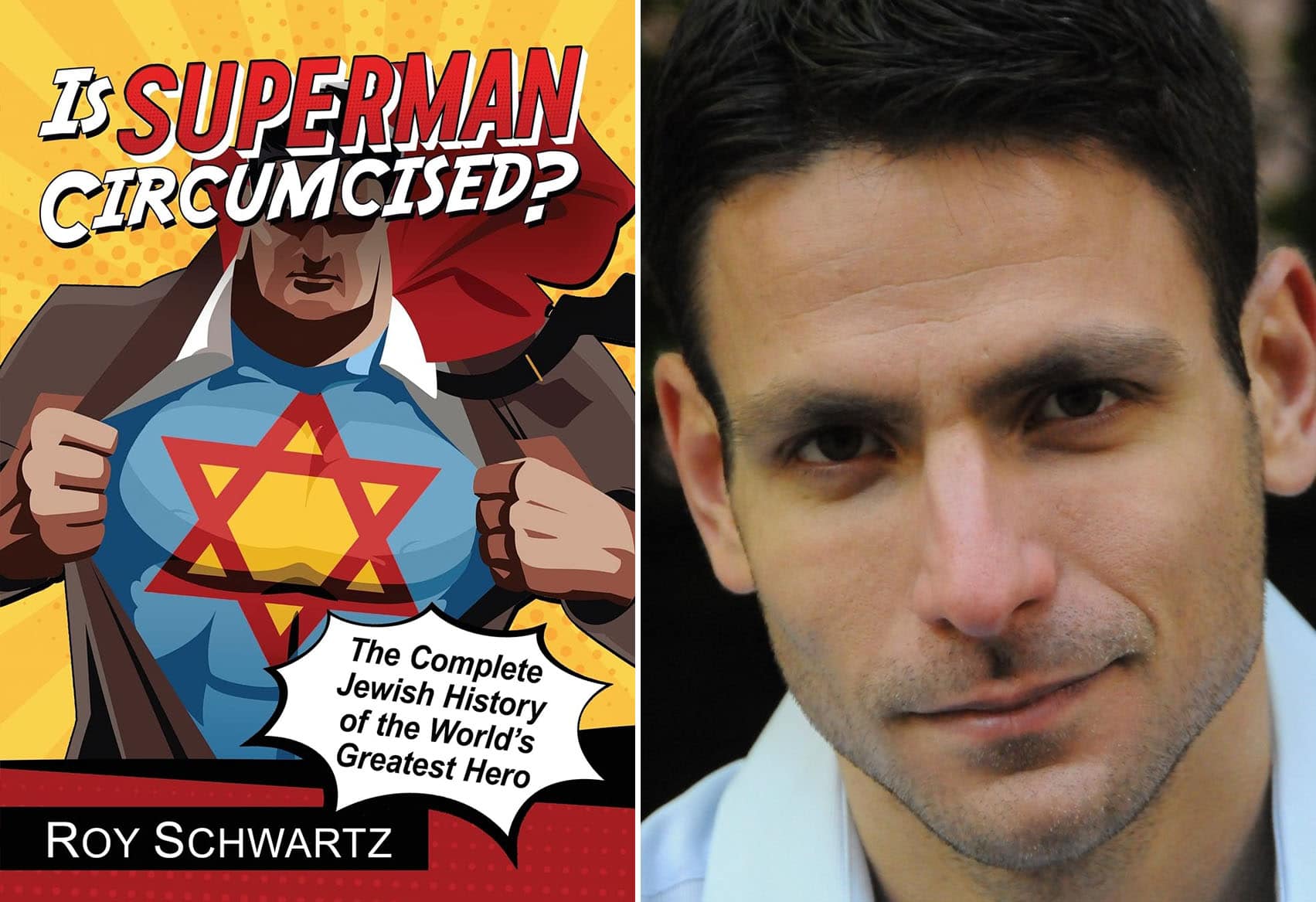
The title of Roy Schwartz’s “Is Superman Circumcised?” (McFarland) is funny, to be sure, but the book is no joke. Rather, it is a fascinating, illuminating and highly accomplished study of a comic book character as the crucial key to understanding both the mysteries of Jewish history and destiny and the makings of modern American civilization.
“From Krypton’s destruction echoing the biblical flood of Genesis, to his origin as a baby rocketed to safety paralleling that of Moses in Exodus, to the Clark Kent persona as a metaphor for the Jewish immigrant assimilation, to Kryptonite symbolizing remnants of the Jewish civilization destroyed in the Holocaust, to his role as a modern golem advocating the New deal, open immigration and interventionism in World War II, Superman’s legend is consistent as Jewish allegory,” he proposes.
Superman was the invention of two Jewish guys from Cleveland, Jerry Siegel and Joe Shuster, the sons of immigrants from the Old Country. Superman, too, is an immigrant from a far-off place – the planet Krypton – and they bestowed upon their readers a pop culture icon that fully embodies the aspirations of new arrivals in America. And yet, as Schwartz insists, the key to understanding Superman is to think of him as Jewish.
“It was like I had found the decryption key to a nearly century-old secret code,” he explains. “His colorful mythology suddenly revealed obvious threads of Jewish culture and folklore, tracing all the way back to the Bible.”
Schwartz himself was born in 1980 and raised in Israel. “Comics are actually how I learned English,” he notes, “which is why I’m comfortable in using words like ‘swell.’” The comics that he encountered in America “were often sophisticated, pithy, avant-garde and sometimes filled with gravitas,” he explains. “Like the rest of my generation I was an avid consumer of all things pop culture, but my parents also instilled in me a love of fine arts and literature. In comics I found the perfect mix of both.” His book, in fact, is based on the master’s thesis that he wrote as a graduate student at the New School in Manhattan.
Schwartz has written a lively and often funny book, but he also offers a short course in the makings of popular culture in all ages and places. Along the way for example, we encounter topics as various as the ancient form of Japanese street performance called “paper theater,” the argument that Adam must be seen as the first Golem, the Jewish psychiatrist who crusaded against comic books on the grounds that they turned “susceptible youths into lecherous, murderous hooligans,” and the reason why “the Star of David, Cross, Old Glory, Swastika and even the Nike Swoosh” perform the same function in their impact on human perception and action.
Yet Superman remains the focus. “He is the Adam of superheroes,” he concludes, “the avant-coureur who heralded the tidal wave of costumed crimefighters that would come to monopolize the comic book medium.” Superman even caught the attention of Nazi Germany, where an SS newspaper singled out Jerry Siegel for attack, calling him “an intellectually and physically circumcised chap” who saw how “the manly virtues of Rome and Greece”’ were now being revived by the Axis and pilfered them for his own comic strips. “As you can see,” the Nazi propagandists insisted, “there is nothing the Sadducees won’t do for money,”
Nor does he overlook the saga of Superman’s creators, who signed away ownership of the money-making machine that was Superman in 1938 for $130. “Perhaps they were strapped for cash, willing to sell their firstborn to Rumpelstiltskin if that’s what it took to turn the beat back on at home,” the author muses. “Or they truly were tricked by rapacious farbrechers into signing away ownership without realizing it.” The truth cannot be ascertained with certainty – “There are as many versions to the story as there are to Superman’s” – but one fact is beyond debate: “They lived to regret it.”
I promise that you will never look at Superman in quite the same way after reading “Is Superman Circumcised?” Schwartz credits Siegel and Shuster with an achievement that he compares to “the transformation that turned ‘The Odyssey’ into ‘Ulysses’ and ‘Romeo and Juliet’ into ‘West Side Story,’” and he places their comic strips in “the canon of modern Jewish literature, alongside the works of Philip Roth, Saul Bellow, Primo Levi and Sholem Aleichem.”
When I was reading Superman comics as a child growing up in the 50s, the Man of Steel was the subject of ongoing speculation and debate that arose from the proposition that he acquired his superpowers only after landing on earth. One questioner asked: How does Superman cut his hair on earth where each strand is as strong as steel? The answer: He flies out of our solar system, whose sun gives him his superpowers, to get a haircut.
So Schwartz has given us an entirely new question to ponder. Superman couldn’t have been circumcised after his arrival on earth because his flesh (like his hair) was now impervious to any cutting implement. So we are left to wonder where his parents found a mohel on Krypton.
Jonathan Kirsch, author and publishing attorney, is the book editor of the Jewish Journal.


































 More news and opinions than at a Shabbat dinner, right in your inbox.
More news and opinions than at a Shabbat dinner, right in your inbox.